Xi, Putin and the Ayatollahs put world on the brink of chaos
With an unholy alliance between Iran, Russia and China putting us on a perilous path towards all-out war, Labor is presiding over the catastrophic run-down of Australia’s already minuscule military capabilities.
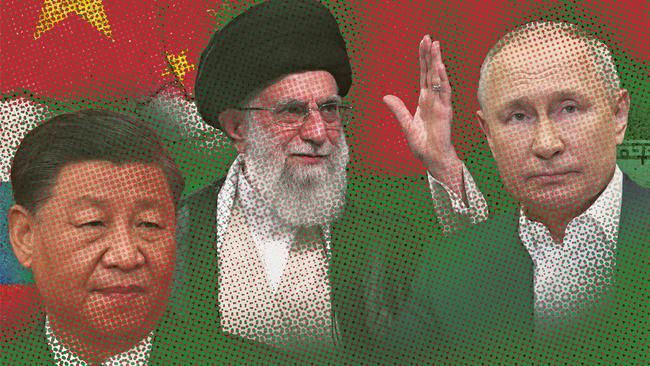
Meanwhile, Russia is starting to prevail in Ukraine. The Ukrainians, long drip fed sufficient weapons to avoid losing, but never enough to make decisive victory possible, are suffering acute battlefield losses, territorial stagnation and the possibility of being overwhelmed at last by an increasing supply of cheap drones to Russia, not least from Iran and North Korea.
In the US, Christopher Wray, the FBI director, testified to congress that Beijing plans through cyber attack to wreak havoc on US domestic infrastructure – water supplies, power generation, oil and gas pipelines, even facilities like hospitals – in the event of hostilities over Taiwan.
Meanwhile, CIA director William Burns sounded the warning on waning US support for Ukraine: “One of the surest ways to rekindle Chinese perceptions of American fecklessness and stoke Chinese aggressiveness would be to abandon support for Ukraine. Continued material backing for Ukraine doesn’t come at the expense of Taiwan; it sends an important message of US resolve that helps Taiwan,” he said.
North Korea has declared it no longer seeks peaceful reunification with South Korea but plans complete domination of the Korean peninsula.
British Defence Secretary Grant Shapps told a London conference the world had moved “from a post-war world to a pre-war world”. Senior NATO figure Dutch admiral Rob Bauer warned allied nations to build their industrial capacity to produce weapons to sustain a long war. He also said allied governments should level with their citizens about resilience, mobilisation, creating bigger military reserves and possibly conscription.
In all this, the Albanese government has been a model of indolence, ineptness, incompetence and inattention. Far from building deterrence, as every US ally should be doing urgently, it’s actually presiding over the catastrophic run-down of Australia’s already minuscule military capabilities.

We can’t put all, or even most, of our old age pensioner ANZAC frigates to sea because we don’t have crews to man them. We can’t move our troops around any battlefield because we don’t have helicopters, having decided, bizarrely, to bury them, showing there are no limits to the folly of Australian defence policy. We cannot confront any military force, no matter how rag-tag, which has armed drones because, although we spend $50bn a year on defence, we ourselves possess neither armed drones nor counter-drone capabilities. As revealed by my colleague Ben Packham, the Defence Department, displaying its characteristic aristocratic leisure, its sinuous sloth, has decided it mustn’t rush, but rather will take eight years to examine and decide which counter-drone system – including trained hawks or eagles – to buy. Actual acquisition would likely take another couple of years. Until then, Australia is defeated by any military with drones, which may be why we decided not to send a ship to help secure freedom of navigation and commerce in the Red Sea.
The Chinese government has gone relatively quiet since it was humiliated by the Taiwanese people electing William Lai as their next president, against Beijing’s threats and intimidation. But with both Japan and Taiwan beefing up their military capabilities, and the US itself finally cranking up its own industrial production of military equipment, with Chinese demography and economic growth entering decline, some analysts think Beijing sees a closing window of opportunity to launch some military action, more likely a blockade than an invasion, against Taiwan.
Russia, meanwhile, with two military bases in Syria, now looks set to establish a nuclear submarine base in Tobruk, in Libya.
Israel has begun flooding the Hamas tunnels under Gaza. Despite immense effort, Israel has been unable to destroy Hamas’s underground tunnel network. This network runs to nearly 600km under the tiny 40km-long Gaza Strip. Some 60 to 80 per cent of these tunnels were still intact by last week.
Hamas doesn’t mind its own people suffering, thus guaranteeing global publicity and condemnation of Israel, so long as its underground command and logistics network remains intact. Yet the world is pressuring Israel to end its Gaza campaign.
Iranian proxies have fired on US soldiers and infrastructure in the Middle East more than 150 times since Hamas attacked Israel on October 7. These strikes have injured numerous US soldiers but only a week ago did such a strike succeed in killing three US soldiers in Iraq. Joe Biden has vowed to retaliate.
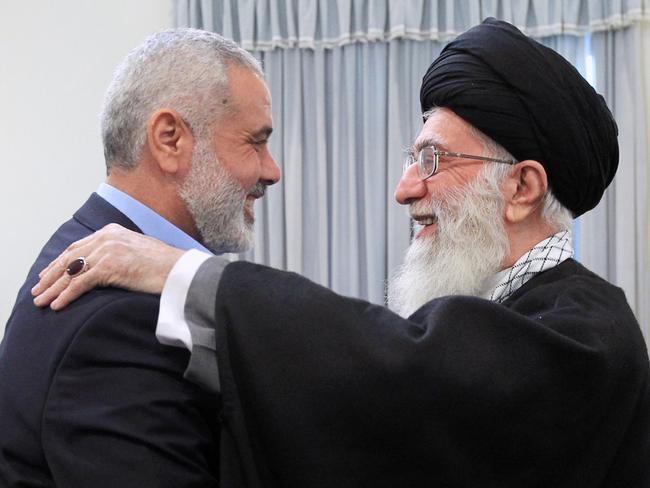
The Iranian-backed Houthis in Yemen have attacked international shipping, including US navy ships, in the Red Sea. Iran’s proxies suggest both Houthi attacks and missile strikes against Israel would cease if Israel came to a complete, permanent ceasefire with Hamas. But this would effectively be victory for Hamas. Similarly, the shocking revelation there is strong evidence that some UN personnel were directly involved in assisting Hamas in its depraved terrorism indicates the corruption and anti-Semitic hatred which permeates parts of the UN system.
On the Israel issue, the Albanese government, unlike the Biden administration, has been a profile of cowardice.
All these moves, and many others, especially those centred on Iran, are difficult to assess and understand properly because each has its specific regional context, and yet each is connected.
Pull back and consider the global picture.
There is a de facto alliance between the three great authoritarian powers, China, Russia and Iran. You can see North Korea as the fourth member of this alliance or as a subset of Chinese power.
These powers don’t have identical interests, or much ideological affection for each other. China is orthodox communist, Moscow is single man dictator imbued with traditions of Russian ultra-nationalism, Iran is a theocratic, revolutionary, ideological Shia Islamist state. They are very different but have common enemies and similar goals.
Iran wants the US out of the Middle East so it can establish regional dominance.
Russia wants the US, and NATO, out of east and central Europe so it can establish regional dominance.
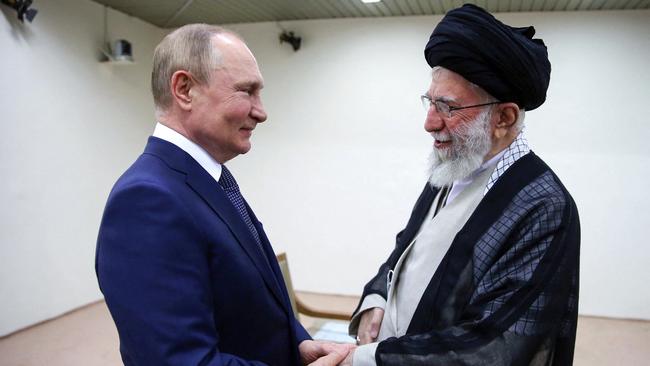
China wants the US out of Asia so that it, too, can establish complete regional dominance, but over a much bigger area.
Each of the three authoritarian partners commands clients, subservient allies and proxy forces. Iran uses Hamas in Gaza, Hezbollah in Lebanon, the Houthis in Yemen and Shia militia in Iraq and Syria. Moscow can deploy Belarus and the breakaway republics it controls in Georgia and Moldova. It has strong influence in Syria, especially with the official state Syrian military. China has North Korea and a couple of Southeast Asian nations it influences greatly. It has a military base in Djibouti at the southern end of the Red Sea and several bases on islands it illegally occupied or built in the South China Sea.
The authoritarian powers exercise differing degrees of control and influence over their clients and proxies. Few involve absolute control. China is much more powerful than Russia, which is much more powerful than Iran. All three, though, have been steadily increasing their militaries, especially China, although Iran is poised to become the world’s 10th nuclear weapons state (after the US, UK, France, China, Russia, North Korea, India, Pakistan and Israel).
The three anti-Western powers share a fixed hostility, if not hatred, of the US and the West generally, with ultra-nationalism and large dollops of paranoia in their respective ideologies. They have been intensifying their military and geopolitical co-operation.
Late last year, Iran joined the BRICS (Brazil, Russia, India, China, South Africa) grouping. Both Iran and North Korea supply weapons to Russia. North Korea sends these weapons by rail through China to Russia.
South Africa helped Iran by bringing an infamous charge of genocide against Israel at the International Court of Justice. Since the Hamas attacks of October 7, Beijing has switched against Israel, in service apparently to both Iran and Russia. Beijing had enjoyed a good relationship with Jerusalem, especially in technology co-operation. It was a relationship which concerned Washington greatly because of the potential for Beijing to buy or steal military technology from Israel. But Beijing has been happy to throw that away in order to join Iran in the anti-Israel ranks at the United Nations and more broadly.
All three authoritarian powers have mastered grey zone, proxy and deniable attacks. When Russia first invaded Crimea a decade ago it disguised its soldiers with non-Russian uniforms. Beijing frequently uses navy ships disguised as coast guard vessels, or even alleged fishing and commercial vessels, to enforce military outcomes in the South China Sea. It violates Japanese and Taiwanese air space. Iran uses its Arab proxies to attack Israel and now Americans in the Middle East. Tehran, Moscow and Beijing calibrate their actions to fall just below that which would trigger a military response from the US directed at them.
US deterrence has plainly broken down, whereas both Moscow and Beijing achieve a good deal of deterrence through the threat of nuclear escalation. When Iran finally acquires nuclear weapons it, too, will play that game.
Paul Dibb, a former deputy secretary of the Defence Department who also held senior intelligence positions, comments: “The post-Cold War era has come to an end and with it the ease of the first couple of decades after the collapse of the Soviet Union, when America could be dominant in the world.”
A certain type of multilateral diplomat is forever bewailing the birth of a new Cold War. In fact, the world will be desperately lucky if the new war is cold rather than hot. The Cold War was above all a way of avoiding direct military conflict among nuclear weapons powers while not allowing strategic dominance by the expansionist authoritarians.
The West prevailed in the Cold War because of steadfast US leadership, clear American superiority in power, wide alliance solidarity, the prestige of democracy throughout the world, the self-belief of Western democracies and the view among our enemies that if necessary the West would fight. All those conditions are much more tenuous now.
Although Russia is involved in a massive, ongoing war in Ukraine, it is Iran which has done the most in recent months to escalate conflict. To get a sense of Tehran’s strategic purpose in these actions I spoke at length to Ehud Yaari, whom I have known for several decades, and who is Israel’s most authoritative and insightful independent strategic analyst.
The Hamas attack on October 7 was discussed at length in advance in Lebanon by leaders from Hamas, Hezbollah and Iran’s Revolutionary Guards, Yaari tells me. He believes Hamas didn’t tell the others the exact date they planned to attack.
“But they used a plan which was a copy of a plan which Iran had given to Hezbollah,” Yaari says. Hamas was allowed to get the impression there would be a second front against Israel opened by Hezbollah in Lebanon and by Shia militias in Syria. But Hezbollah leaders, presumably on Iranian instruction, decided not to join in fully.
Yaari identifies five strategic aims of Iran. The first was to prevent Israel concluding a peace treaty, and opening diplomatic relations, with Saudi Arabia.
Since the October 7 attack, Iran’s other four priorities are:
1. One. Prevent the complete eradication of Hamas in Gaza.
2. Two. Prevent Hezbollah from getting into an all-out war with Israel. Keep it rather on a low burn, with all out war involving Hezbollah retained as a strategic lever to pull if Iran itself is ever under direct threat from Israel.
3. Three. Open a militia rocket front against Israel in Iraq and Syria. In Yaari’s view, this has been stopped in Syria by Vladimir Putin. He has put a lot of effort and investment into reviving Syria’s national armed forces. He doesn’t want them destroyed by Israel. He also wants to keep his two military bases in Syria.
4. Four. Take advantage of the boost from the Hamas attack to get the Americans out of northeast Syria and out of Iraq, especially the Kurdish areas.
Yaari believes Iran is also putting major effort into smuggling rockets, explosives and other weapons through Jordan into the Palestinian West Bank. Jordan is doing its best to prevent this, but it’s a difficult operation to completely suppress. Yaari wouldn’t be surprised if Iran managed to put some terrorists into Jordan, against the will of the Jordanian government, who could fire rockets at Israel and perhaps even attempt to infiltrate Israel from across the Jordanian border.
Although Iran wants to put the US under maximum pressure through the actions of its proxies, there is some reason to think that it, too, is still scared of America and careful.
The militia which killed the three Americans quickly announced it was suspending operations against Americans, to spare the Iraqi government embarrassment. Iran repeatedly denied any involvement in the strike on the Americans, though that is a fatuous claim.
Nonetheless, Yaari suggests, Iran is happy to fight America to the last Arab in Lebanon, Iraq or Yemen, but it doesn’t want to be attacked itself directly, which the US could do.
Biden, stressing he doesn’t want a wider war, keeps trying to reassure everyone of America’s restraint. In doing this, he may be encouraging further military actions by the aggressive authoritarians who think he won’t do anything much.
In fact, Biden gets a mixed report on the Middle East. After October 7, he’s been steadfast in backing Israel. He has two aircraft carriers in the region to deter Iran. Israel appreciates this but so do the Gulf Arab states.
Biden has his manifest weaknesses but, not having been educated at Harvard, he can still work out that when an Islamist death cult commits depraved, savage and sustained terrorism against a liberal democracy, you back the liberal democracy.
On the other hand, Biden has spent three years trying to woo Iran back into Barack Obama’s nuclear deal. As a sweetener, Biden didn’t enforce sanctions against Tehran. Iran never had any interest in Biden’s deal but was smart enough to keep his administration hoping. Sanctions, as Donald Trump understood, were a non-military way for the US to bring pressure on Iran.
This week a prominent Saudi journalist, Tariq Al-Homayed, in a representative view from the Gulf, wrote with some bitterness: “Washington has been soft with Tehran, making one concession after another, under flimsy justifications that are so naive that it is difficult to believe.” He demanded Biden make a serious response to the Iran-backed killing of US soldiers.
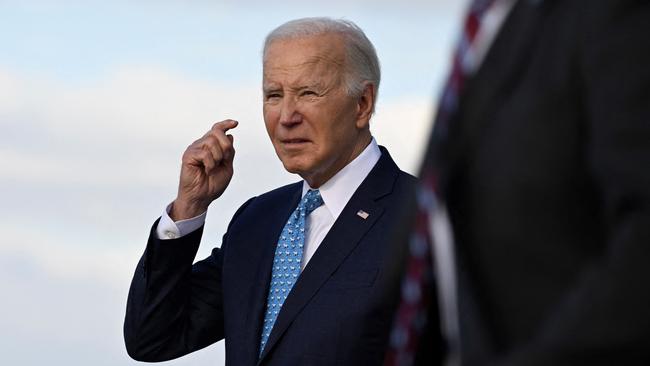
Walter Russel Mead commented recently in The Wall Street Journal that even the World Economic Forum at Davos was starting to move a little rightwards as it slowly realised that everything it liked in the modern world, everything that might be called liberalism, depended ultimately on American military power. The world order which has lifted billions of people out of poverty, and kept us out of world war for 80 years depends entirely on US military strength.
That military strength is sorely tested today by Iran and Russia, with Iran on the brink of nuclear weapons. Even America can’t do everything at once. Some of its most dependent allies, like Australia, offer no useful military help. Does Beijing see this time of acute US stress, with the Biden/Trump contest looming, as its opportunity?
The world tensely awaits the answer to that question.



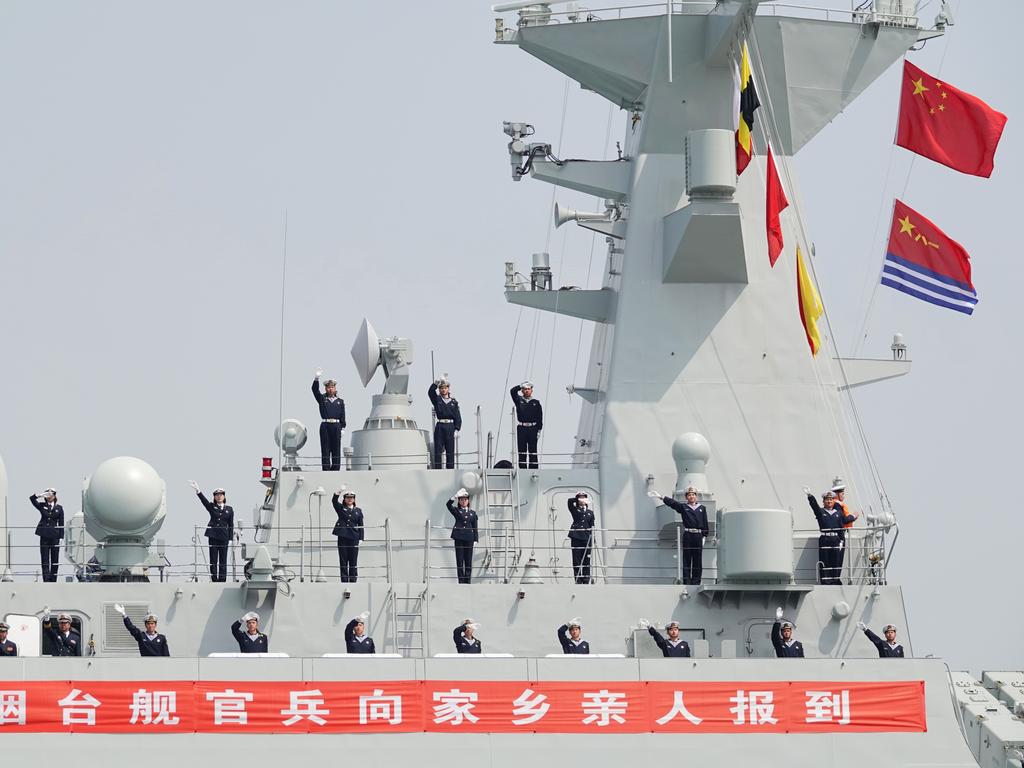




The world stands on the brink of security collapse and perhaps widely extended war. Iran has moved its proxies directly into killing American soldiers in the Middle East. In a season of considered escalation by the mullahs in Tehran, the International Atomic Energy Agency warns that Iran now has sufficient highly enriched uranium that it could produce several nuclear devices in a short period.